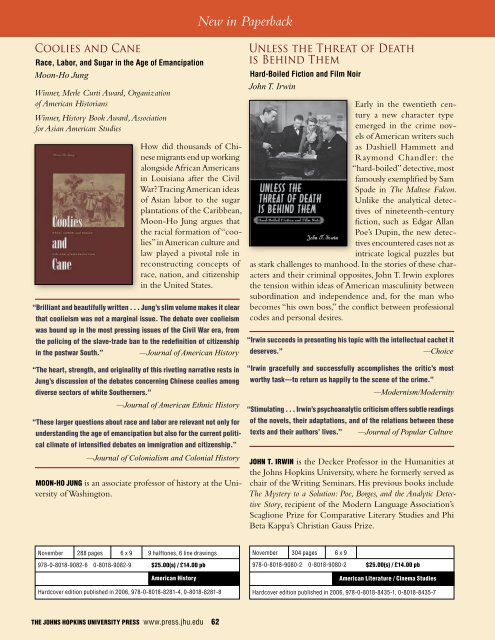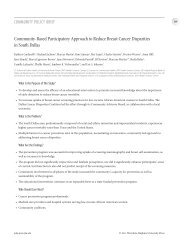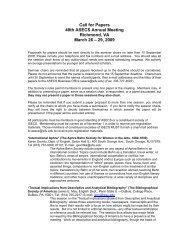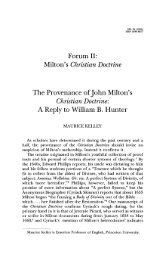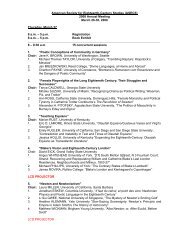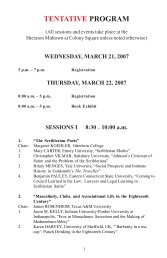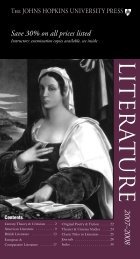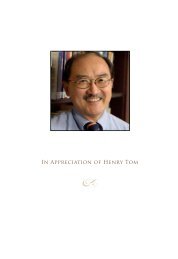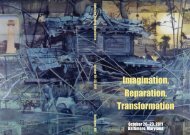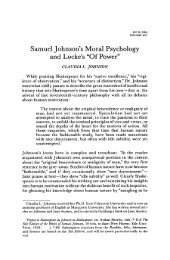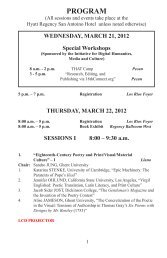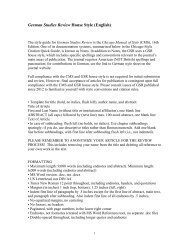Fall 2008 - The Johns Hopkins University Press
Fall 2008 - The Johns Hopkins University Press
Fall 2008 - The Johns Hopkins University Press
You also want an ePaper? Increase the reach of your titles
YUMPU automatically turns print PDFs into web optimized ePapers that Google loves.
New in PaperbackCoolies and CaneRace, Labor, and Sugar in the Age of EmancipationMoon-Ho JungWinner, Merle Curti Award, Organizationof American HistoriansWinner, History Book Award, Associationfor Asian American StudiesHow did thousands of Chinesemigrants end up workingalongside African Americansin Louisiana after the CivilWar? Tracing American ideasof Asian labor to the sugarplantations of the Caribbean,Moon-Ho Jung argues thatthe racial formation of “coolies”in American culture andlaw played a pivotal role inreconstructing concepts ofrace, nation, and citizenshipin the United States.“Brilliant and beautifully written . . . Jung’s slim volume makes it clearthat coolieism was not a marginal issue. <strong>The</strong> debate over coolieismwas bound up in the most pressing issues of the Civil War era, fromthe policing of the slave-trade ban to the redefinition of citizenshipin the postwar South.” —Journal of American History“<strong>The</strong> heart, strength, and originality of this riveting narrative rests inJung’s discussion of the debates concerning Chinese coolies amongdiverse sectors of white Southerners.”—Journal of American Ethnic History“<strong>The</strong>se larger questions about race and labor are relevant not only forunderstanding the age of emancipation but also for the current politicalclimate of intensified debates on immigration and citizenship.”—Journal of Colonialism and Colonial HistoryMoon-Ho JUNG is an associate professor of history at the <strong>University</strong>of Washington.Unless the Threat of Deathis Behind <strong>The</strong>mHard-Boiled Fiction and Film NoirJohn T. IrwinEarly in the twentieth centurya new character typeemerged in the crime novelsof American writers suchas Dashiell Hammett andRaymond Chandler: the“hard-boiled” detective, mostfamously exemplified by SamSpade in <strong>The</strong> Maltese Falcon.Unlike the analytical detectivesof nineteenth-centuryfiction, such as Edgar AllanPoe’s Dupin, the new detectivesencountered cases not asintricate logical puzzles butas stark challenges to manhood. In the stories of these charactersand their criminal opposites, John T. Irwin exploresthe tension within ideas of American masculinity betweensubordination and independence and, for the man whobecomes “his own boss,” the conflict between professionalcodes and personal desires.“Irwin succeeds in presenting his topic with the intellectual cachet itdeserves.”—Choice“Irwin gracefully and successfully accomplishes the critic’s mostworthy task—to return us happily to the scene of the crime.”—Modernism/Modernity“Stimulating . . . Irwin’s psychoanalytic criticism offers subtle readingsof the novels, their adaptations, and of the relations between thesetexts and their authors’ lives.” —Journal of Popular CultureJohn T. IRWIN is the Decker Professor in the Humanities atthe <strong>Johns</strong> <strong>Hopkins</strong> <strong>University</strong>, where he formerly served aschair of the Writing Seminars. His previous books include<strong>The</strong> Mystery to a Solution: Poe, Borges, and the Analytic DetectiveStory, recipient of the Modern Language Association’sScaglione Prize for Comparative Literary Studies and PhiBeta Kappa’s Christian Gauss Prize.November 288 pages 6 x 9 9 halftones, 6 line drawings978-0-8018-9082-6 0-8018-9082-9 $25.00(s) / £14.00 pbamerican HistoryHardcover edition published in 2006, 978-0-8018-8281-4, 0-8018-8281-8November 304 pages 6 x 9978-0-8018-9080-2 0-8018-9080-2 $25.00(s) / £14.00 pbAmerican Literature / Cinema StudiesHardcover edition published in 2006, 978-0-8018-8435-1, 0-8018-8435-7THE JOHNS HOPKINS UNIVERSITY PRESS www.press.jhu.edu 62


